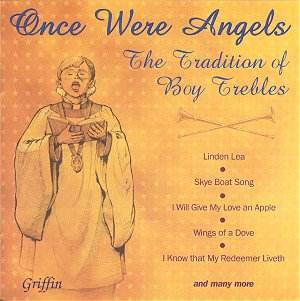The presiding spirit behind this disc is Harry
Mudd, who has done so much to further the newer traditions in
treble singing and who has witnessed the changes not only in nomenclature
("boy soprano") but in matters of style and voice production.
These he has faithfully recorded, and record companies such as
Alpha and Abbey have eloquently presented them on LP over many
years. This CD is, in effect, both a tribute to Mudd and a quasi-manifesto
of tradition and of performance practice. Derived from those LPs
it presents leading boy trebles of the past quarter century or
so and gives us the opportunity to analyse and distinguish between
those voices – also, not least, simply to enjoy listening to them.
There are some familiar names here – and some
less familiar. It’s a feature of the disc that potted biographies
describe the early life and training of each of the trebles –
and then gives us a sentence or two as to their subsequent life
and careers. Many have stayed in music – teaching, leading choirs
whilst others have pursued different lives (doctors, working for
the UN and the like). There won’t be too many surprises over the
repertoire. Andrew Wicks starts with a charmingly delicate and
innocent Linden Lea and Paul Dutton gives us a scrupulous
and beautiful unaccompanied I will give my love an apple.
Wicks has to cope with the Mozart Alleluia, which has a
succession of exceptionally taxing divisions – he remains
splendidly in tune even at the top of his register. I suppose
O for the Wings of a Dove had to appear – but here it’s
sung by Michael Ginn with none other than the Choir of the Temple
Church directed by Sir George Thalben-Ball in his last recording
and if it doesn’t summon up the seraphic ghost of Master you-know-who
it’s still a precious souvenir. Dara Carroll was then probably
less well known than, say, Dutton and Wicks were but he sings
a most attractive, unaccompanied Lark in the Clear Air
and Skye Boat Song – clarity and excellent rhythm. I was
less happy with the Pie Jesu from Fauré’s Requiem
(though not with his voice I should add) – where David Lumsden
seems to want to test Carroll’s legato and breath control with
a stodgy tempo in the pious manner. That Carroll sings so well
is no thanks to his organist.
I like the lightness of Wicks’ Der Musensohn,
and we get a nice little band to support the flighty duo of
Thomas Hunt and Paul Dutton in Vivaldi’s Laudamus te. The
slightly darker treble of Jeremy Bowyer can be heard in Happy
Iphis, shalt thou live with its bell like clarity and confidence
(though rather back in the balance in Southwark Cathedral, which
is a bit of a pity). In fact, as the notes admit, some of these
recordings were made in less than optimum conditions but I have
to say it rarely bothered me. As with the preceding it’s a shame
that Dutton is rather overpowered by Donald Hunt’s piano in Elgar’s
Shepherd’s Song but the conception is good. Daniel Ludford-Thomas
makes a good showing in Mary Plumstead’s popular anthem A grateful
heart – organist Andrew Shenton breathes with his soloist
with registral and tempo sensitivity at all times. Both rise to
declamatory strength in Stanford’s A song of wisdom.
Michael Criswell is a GP now and I hope he treats his patients
with as much sensitivity as he shows towards Schütz’s Be
not afraid – purity and grace. Mozart’s Agnus Dei receives
a most convincing and tender performance from James Davis and
Donald Hunt and Peter Davey cope well with Purcell’s magisterial
Evening Hymn – with its attendant difficulties of breath
taking, complex divisions and emotional depth. Robin Blaze is
a name not unfamiliar now – as one of this country’s leading young
counter-tenors he has proved himself to be a musician of acute
intelligence and beauty of tone. He was taking great care over
articulation even as a boy – Drop, drop slow tears - and
commands the charm and sweep for Vaughan Williams’ I got me
flowers. Finally and not inappropriately, then, we finish
with Paul Dutton, ex-Leeds Parish Church, and one of the leading
trebles of his generation along with Andrew Wicks. He essays I
know my Redeemer Liveth with great skill, adding some little
ornaments along the way (not all of which work but that’s a minor
point). He’s accompanied by organ and an unfortunate solo string
player but all ears are on Dutton.
As an archive of the trebles of that time this
is a charmingly successful disc. Musically quite a bit of ground
is covered, and the booklet includes, as well as those biographical
notes, pictures of the youthful singers. Oh the haircuts, the
haircuts!
Jonathan Woolf





